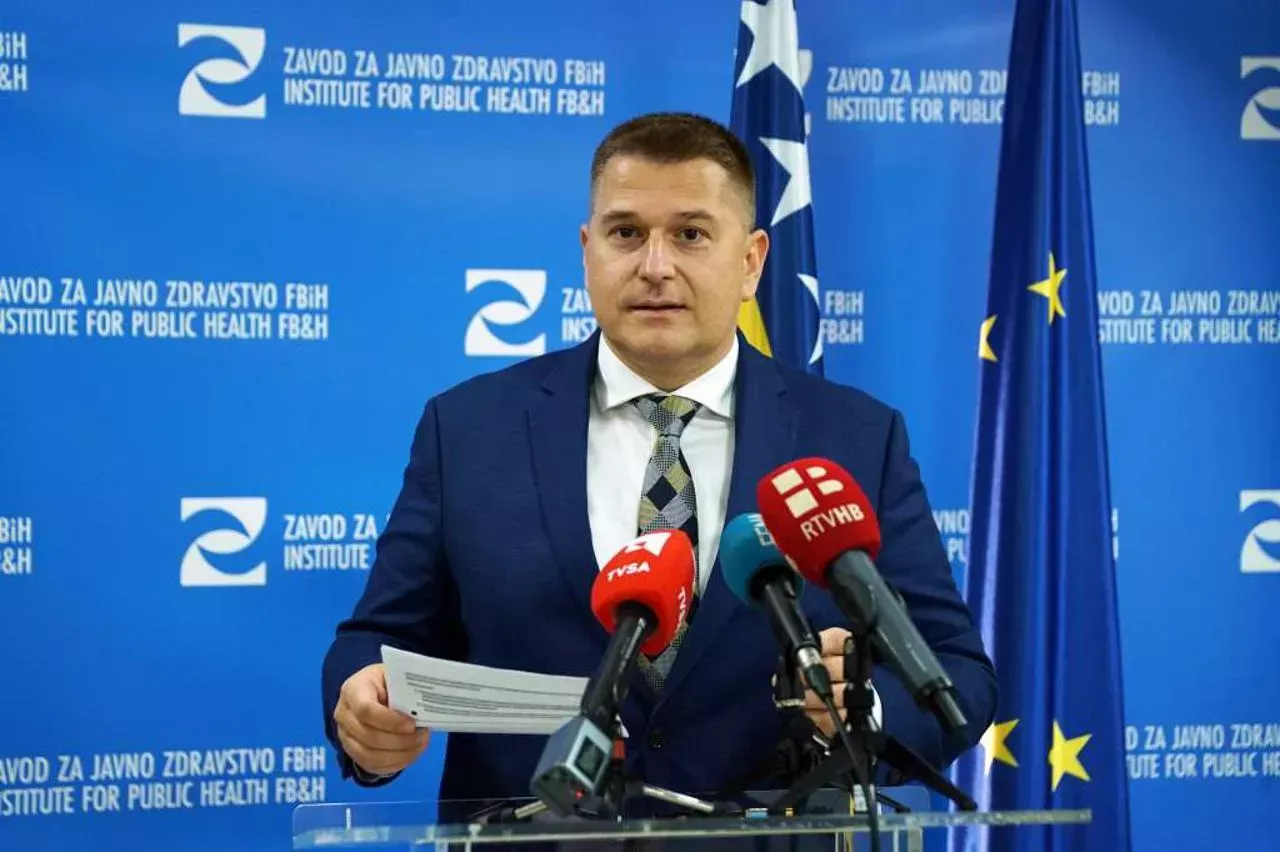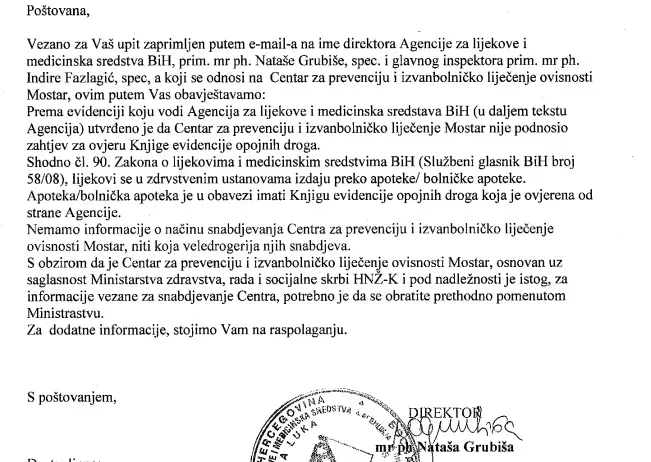
Written by: Amina Čorbo-Zećo
The question is, how much of a newsworthy event in Bosnia and Herzegovina is it when a small-time dealer, distributing drugs for much bigger cartel players, is arrested? However, the revelation that there exists in our country a center for opiates operating within the state system, while simultaneously running a questionable medical facility that meets its clients’ needs with methadone, is far beyond what any reasonable person can comprehend. Moreover, very few within the state system even know what we are talking about when we raise such inquiries.
This is one of those stories. The Center for Prevention and Outpatient Treatment of Addictions in Mostar was officially opened on September 13, 2018, and remains largely unknown within the Federation of BiH’s healthcare system.
At the helm of the Center is Dragan Čović’s appointee, Siniša Skočibušić, who simultaneously serves as the director of the Public Health Institute of the Federation of BiH. Skočibušić was appointed director of the Public Health Institute in November 2021 for a four-year term. At that time, he was already leading the Center, raising questions about how it is possible for Skočibušić to hold two directorial positions simultaneously. According to unofficial sources from the FBiH government, it is entirely unknown that Skočibušić occupies both roles at the same time.
But behind it all could lie a much bigger story, as the Center’s methods of operation raise suspicions of illegal activities. Our investigation sought to shed light on the case of the last remaining Center for Addiction Treatment, given that similar centers have been replaced by institutes for addiction treatment. This means that such institutions must operate at the cantonal or higher level.

Federation of BiH Health Protection Law – Article 123
Patria’s findings clearly indicate that the Mostar Center operates outside institutional frameworks, without adequate oversight or controls. The only information the relevant Ministry of Health, Labor, and Social Welfare of Herzegovina-Neretva Canton (HNC) has comes from the Center’s annual reports.
There has long been an uncritical perception in Bosnia and Herzegovina that the south of the country functions as a system unto itself, with its own set of rules. It is not uncommon for institutions and companies under HDZ and Dragan Čović’s control to behave as if they are independent entities.
However, the issue with the Center led by Skočibušić is a question of societal and state security, as procedural shortcomings and the legality of both the Center’s operations and its director’s actions raise suspicions of unlawful practices.
The Center uses methadone in solution form with a concentration of 10 mg/mL (5 mg = 0.5 mL) as its therapy. If judged by the therapies provided, the Center undoubtedly requires oversight. However, the Center lacks a hospital pharmacy, and the BiH Medicines Agency has not approved its narcotics record book, which the Center is legally obligated to submit.

Law on Prevention and Suppression of Drug Abuse – Article 60
We asked the BiH Medicines Agency about this, and they confirmed to Patria:
“According to the records maintained by the BiH Medicines and Medical Devices Agency, the Center for Prevention and Outpatient Treatment of Addictions in Mostar has not submitted a request for the approval of its narcotics record book. In accordance with Article 90 of the BiH Medicines and Medical Devices Law, medications must be dispensed through a pharmacy or hospital pharmacy in healthcare institutions. Such pharmacies are obligated to maintain a narcotics record book approved by the Agency.”
Thus, the Agency, as the supervising and regulatory body, has no record of who, how, where, and to whom methadone therapy is being dispensed within the Center.
The supply of methadone and the Center’s overall functioning remain a mystery even after the Agency’s response.
“We have no information on how the Center for Prevention and Outpatient Treatment of Addictions in Mostar is supplied with methadone, nor which distributor provides their supply. Since the Center was established with the consent of the HNC Ministry of Health, Labor, and Social Welfare and falls under its jurisdiction, inquiries regarding the Center’s supply should be directed to the aforementioned Ministry,” the Agency stated further.

Response from the BiH Medicines Agency to Patria’s Inquiry
The HNC Ministry of Health did not respond to our inquiries about whether and when the Center was last inspected, how many patients it serves, or how many medications have been dispensed. We only received a brief confirmation that the Center does not have a hospital pharmacy, but no further details about any agreements it may have with other pharmacies.
“It is evident that patients visit the Center because methadone therapy is available there, supplied by someone. However, questions about who the patients are, where they come from, how they are admitted, and who oversees the entire process remain unanswered.
The Center ignored Patria’s inquiries about how it procures medications, whether it has a hospital pharmacy, and which distributor it contracts with. They also failed to clarify who approves their narcotics record book, given that the BiH Medicines Agency has no information about the Center’s supply chain. Moreover, the legality of Skočibušić simultaneously holding two directorial positions also remains unaddressed.
One employee was surprised by our inquiry, stating that “Skočibušić has been the director for a long time.”
The questionable legality of the Center’s operations becomes even more apparent when reviewing their website, which states that no referral is needed to begin treatment—just a health and personal identification card. Patients without health insurance can still receive treatment through the Center. Treatment is available to patients from HNC, Western Herzegovina Canton, and even parts of eastern Republika Srpska, for which agreements with the relevant ministries in the smaller BiH entity are required.
According to the Federation of BiH Health Protection Law, addiction treatment institutions must operate within clearly defined legal parameters. For example, the Sarajevo Addiction Treatment Institute requires a referral from a family doctor, a verified health insurance card, an ID card, and HIV and hepatitis marker test results.
In contrast, one can simply visit Mostar and receive therapy with just an ID card and health insurance card.
According to the Center’s 2023 report, their operations are thriving. The report states they registered 988 users in 2023, with an average of 115 patients per month, totaling 1,381 annually. “A total of 35,732 doses of methadone were consumed, equivalent to 214,674.5 mL / 2,146,745 mg (~429 bottles of methadone hydrochloride solution, 10 mg/mL),” the report reads.